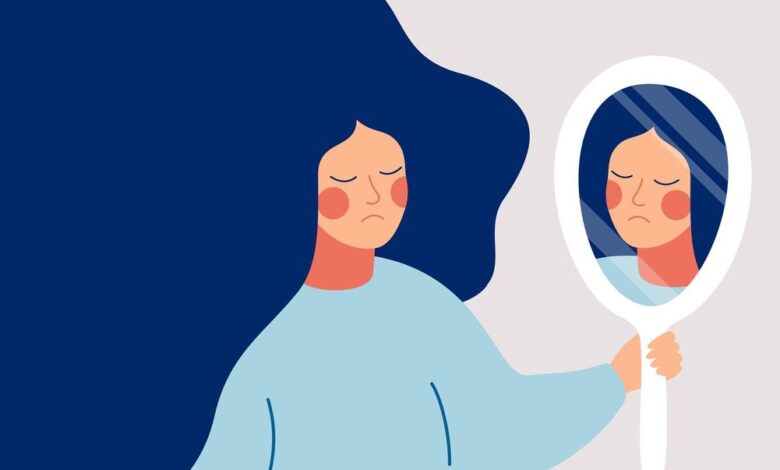How Eczema Impacts Emotional Well-Being

[ad_1]
For Karina Santana, now 27, eczema (also known as atopic dermatitis or atopic eczema) has been a part of her life since she was 8 or 9 years old when she first noticed the patches of dry skin on her arms. By the time she was a teenager, it had spread to her eyelids and around her mouth, impacting more than just her skin as she started to get bullied about it in school. “Other kids would make fun of my face and just make really unnecessary comments,” Santana says. “It brought down my self-esteem.”
That impact on her emotional well-being is something she still struggles with. “Sometimes my self-esteem is there and I feel great and ready to conquer the day, other days I can’t find something to wear that won’t make me itch or that doesn’t hide the eczema, and I don’t want to go outside,” she says. “On the street I see people staring and I know they’re looking at my eczema. Or people at work will ask why my skin is so red. It takes a mental toll and can bring about negative emotions like feelings of anxiety and depression.”
Santana isn’t alone. Eczema can also impact people’s emotional well-being and can be associated with sleep disturbance, anxiety, and depression.2
“It’s one of my biggest pet peeves when people without atopic dermatitis say, ‘oh, it’s just eczema,’ like it’s no big deal,” says Jonathan Silverberg, MD, PhD, the director of clinical research in the department of dermatology at The George Washington University School of Medicine and Health Sciences. (Dr. Silverberg has heavily researched the far-reaching burdens of having chronic skin diseases that are associated with itch, such as atopic dermatitis.) “Maybe in its mildest forms that’s true, but as you get into more severe forms, it can become a chronic, debilitating disease with a far greater reach than just requiring you to put on some lotion every day.”
Eczema’s Far-Reaching Impact
Eczema is a chronic skin condition that can cause signs and symptoms for patients such as unpredictable flares, intense itching, swelling, cracking, or crusting on patches of skin. 3,4 Eczema flares can wind up affecting many different aspects of a person’s lifestyle.5 “It can impact work productivity, restrict your social activities, put stress on relationships—it can even determine the type of clothing you wear,” says Dr. Silverberg. “And all of this can bring down your sense of self-esteem.”
Some people even cut back on things they enjoy, like exercising, if it leads to flares, says Dr. Silverberg. “Coping with the disease can cause someone to take all the fun out of life. Everything they do ends up being based on how to avoid flaring up their skin disease, he says. “Even a career choice or relationship can be impacted because they want to avoid interacting with others.”
There is also the emotional toll and distress of the itch and pain that comes with eczema.6 “The itch can be absolutely unbearable—it can have a bigger impact on quality of life than pain,” says Dr. Silverberg. “The only way to alleviate it is to scratch, but people worry about scratching in public where other people can see, so they suffer in silence.”
All of this can impact work productivity, disturb sleep, and more, Dr. Silverberg says. “Sometimes someone will ask me why I don’t just stop scratching—they don’t understand how intense the itch is,” Santana says. “They don’t know what it’s like waking up itching at night or to not know what’s causing your flare ups or not feeling good about yourself.”
The Lack Of Understanding & Stigma
For eczema sufferers, Dr. Silverberg notes that one of the hardest parts is how others tend to minimize what they’re going through. “There are certain diseases like cancer and heart attacks that can have a deadly result and, as a result, have a lot of disease awareness,” he says, adding, “Atopic dermatitis isn’t like that—even though it can be debilitating and ruin so many aspects of their lives.”
This means people just don’t think it’s that big of a deal—something that’s also driven by the fact that so many people who have eczema don’t like to talk about their condition, Dr. Silverberg points out. “There is a lot of stigma surrounding it and people worry that others will think they’re contagious if they bring it up,” he says.
Santana wishes she had started talking about her eczema with others sooner. “I was always shy about it and insecure and just wanted to cover it up,” she says. “But a lot of people don’t know too much about eczema, and I want to share what I’ve learned with others. I should have been speaking about it earlier.”
A Mind/Body Treatment Plan
All of these challenges support the need for doctors to work with eczema patients on both the physical and emotional impacts of the disease. “It’s so important for doctors to recognize that by improving itch and skin lesions, they can also help improve their patients’ overall mental health,” says Dr. Silverberg.
Bringing up emotional well-being during treatment discussions can also ensure patients are keeping an eye out for issues before they get too serious. “Sometimes people have this disease for 30 or 40 years, so the impact on mood and anxiety can linger for a long time,” says Dr. Silverberg.
For Santana, she feels like she’s finally gotten to a place where she’s starting to accept her body, eczema and all. “In the last year, I started getting more in tune with myself and have been trying to not let my eczema overpower me or my feelings,” she says. “I’ve seen so many others deal with it and be brave and I want to help others too.”
Eczema doesn’t impact everyone the same way—its appearance can vary on different skin tones, which can lead to underestimation of severity in patients of color; and severity of itch or skin pain can fluctuate greatly across all individuals.3,7-11 For these reasons, it’s so critical for those with eczema to talk to their doctor about the physical and emotional toll it’s taking on them. In an ideal world, dermatologists would bring up mental health concerns during appointments, but that doesn’t always happen, says Dr. Silverberg.
Anyone concerned about symptoms of anxiety or depression related to their eczema should ask their dermatologist for a referral to a mental health expert who can help with these issues. It’s important that patients speak up to their doctor about both their physical and emotional symptoms to help best manage their care, including what treatment options may be available to them.
To learn more about atopic dermatitis and how to have an informed discussion with your doctor, click here.
References:
1. Schonmann Y, Mansfield KE, Hayes JF, Abuabara K, Roberts A, Smeeth L, Langan SM. Atopic eczema in adulthood and risk of depression and anxiety: a population-based cohort study. J Allergy Clin Immunol Pract. 2020;8(1):248-257.e16. doi: 10.1016/j.jaip.2019.08.030
2. Silverberg JI, Gelfand JM, Margolis DJ, et al. Symptoms and diagnosis of anxiety and depression in atopic dermatitis in U.S. adults. Brit J Dermatol. 2019;181(3):554-565. doi: 10.1111/bjd.17683
3. Weidinger S, Beck LA, Bieber T, Kabashima K, Irvine AD. Atopic dermatitis. Nat Rev Dis Primers. 2018;4:1.
4. Simpson EL, Bieber T, Eckert L, Wu R, Ardeleanu M, Graham NM, Pirozzi G, Mastey V. Patient burden of moderate to severe atopic dermatitis (AD): Insights from a phase 2b clinical trial of dupilumab in adults. J Am Acad Dermatol. 2016;74(3):491-8.
5. Zuberbier T, Orlow SJ, Paller AS, et al. Patient perspectives on the management of atopic dermatitis. J Allergy Clin Immunol. 2006;118(1):226-232.
6. Anderson RT, Rajagopalan R. Effects of allergic dermatosis on health-related quality of life. Curr Allergy Asthma Rep. 2001;1:309–315.
7. Kaufman B, Alexis A. Eczema in skin of color: what you need to know. National Eczema Association (NEA) Web site. https://nationaleczema.org/eczema-in-skin-of-color/. Accessed 23, 2020.
8. Silverberg JI. Public health burden and epidemiology of atopic dermatitis. Dermatol Clin. 2017;35:283-289.
9. Brunner PM, Guttman-Yassky E. Racial differences in atopic dermatitis. Ann Allergy Asthma Immunol. 2019;122:449-455. doi:10.1016/j.anai.2018.11.015.
10. Silverberg JI, Gelfand JM, Margolis DJ, et al. Pain is a common and burdensome symptom of atopic dermatitis in United States adults. J Allergy Clin Immunol Pract. 2019;7(8):2699-2706.
11. Kaufman BP, Guttman-Yassky E, Alexis AF. Atopic dermatitis in diverse racial and ethnic groups-Variations in epidemiology, genetics, clinical presentation and treatment. Exp Dermatol. 2018 Apr;27(4):340-357.
This content is created and maintained by a third party, and imported onto this page to help users provide their email addresses. You may be able to find more information about this and similar content at piano.io
[ad_2]
Source link






